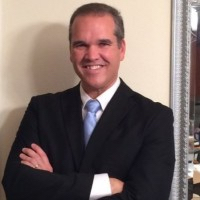Some expect cities and counties to care for homeless residents. Others say it punishes vulnerable people.
By Alex Lieberman
Original Air Date: May 21, 2025
Host: Florida House Bill 1365 went into effect on October 1 of last year, and its enforcement began in January. The law bans sleeping or camping on public property that is not designated by the Florida Department of Children and Families (DCF). Counties and municipalities can be sued for not complying. Alex Lieberman has a close look at the effects of the anti-homeless law.
Alex Lieberman: The DCF released a brief explaining the law. It said that a property cannot be used for a continuous period of more than a year for public camping. Counties also are not required to designate any property for public sleeping.
Chris Johnson of United Way of South Sarasota County formerly worked for the Salvation Army and Suncoast Partnership to End Homelessness. He believes the bill puts the responsibility of housing homeless people on the shoulders of local governments.
 Chris Johnson: The idea behind the bill is that those individuals who are homeless cannot sleep on the streets and, as a caveat in that, local municipalities or counties have to create a system that that individual has somewhere to go.
Chris Johnson: The idea behind the bill is that those individuals who are homeless cannot sleep on the streets and, as a caveat in that, local municipalities or counties have to create a system that that individual has somewhere to go.
AL: Johnson believes that Sarasota has done a good job caring for homeless citizens before the law. It created the Homeless Outreach Teams, which could help find a shelter bed and supply a case manager to assist in finding more permanent housing and a livelihood. Further, Sarasota has had ordinances effectively prohibiting the same activities as detailed in the bill.
CJ: The city and the county of Sarasota have both done a lot of work heading up to this, especially with the Lodging Out-of-Doors ordinance within the City of Sarasota and the Quality of Life ordinances in the county. Some of these things were already in place where people weren’t allowed to show signs of bedding or cooking or latrines or things like that out in public, but they were forward-thinking of creating a path to that person already. Even though this new bill is coming to play, the city and the county—at least Sarasota City and Sarasota County—have already set up a path that people can do that. They’ve actually been very, very progressive in thinking about it that way.

Chris Johnson
AL: Meredith Censullo is the Public Information Officer with the Bradenton Police Department. She states that, similar to Sarasota, “The law’s implementation didn’t change how the Bradenton Police Department functions because the City of Bradenton has, for many years, had an ordinance prohibiting camping/sleeping on public property.” The police department in Bradenton also has a Homeless Outreach program, and officers from it as well as the Community Redevelopment Agency are responsible for enforcing ordinances. If individuals are willing, officers will transport them to the Salvation Army and provide bus tickets to reach family.
However, Johnson worries for other areas in the state.
CJ: I think those cities and other counties who haven’t been as forward-thinking are going to struggle, because then it’s a matter of, “How do they set up a system quickly with the funding that they already have, or can they get additional funding? Who’s going to man these types of places? Who’s going to provide the services?” They’ve got to find partners who can do that. In the environment today—here’s where things have changed—with the federal government changing the way it is, a lot of nonprofits that are heavily dependent on federal funding are in a very tenuous place.
AL: Many nonprofits receive federal funding through Americorps, and the Trump administration has cut nearly $400 million in grants to the organization.
Erin Minor, Vice President of Community Leadership at Gulf Coast Community Foundation, is concerned that the bill could criminalize anyone who cannot afford a place to live, especially amidst rising housing costs. She used to be the CEO of Harvest House, a housing and hunger relief provider, and thus has additional experience working with homeless people.

Erin Minor
Erin Minor: I think it’s important for us and for our legislators to make sure that, as we are creating bills and legislation, we are looking at the human that is impacted by these bills. We want to ensure that we are creating solutions and not necessarily potentially some more barriers or issues for some of our most vulnerable citizens.
AL: Taylor Neighbors is the Chief Executive Officer at Suncoast Partnership to End Homelessness, which serves Manatee and Sarasota County, and has had a few family members experience homelessness. Like Johnson, she believes Sarasota was ahead of the times. Neighbors mentioned that Manatee County has also been proactive with systems and practices similar to Sarasota.
Taylor Neighbors: I would say our community is doing pretty well, and this House bill really didn’t change a lot because we already had a pretty strong system in place working with our local government and the two counties that we serve.
AL: She believes that the bill could catalyze other municipalities to reflect on their homeless crisis and encourage them to establish better processes to provide housing.
She said that the bill could have a positive impact to some degree on homeless people, but the bulk of the bill is putting stress on local governments rather than individuals experiencing homelessness.
TN: It forces counties and cities to make sure there’s a strong system in place. We always say you have to have those front-end measures—the diversion, the prevention, early intervention and shelter options—but there’s also got to be housing on the end of that.
AL: Kevin Lyons, on the other hand, has struggled with housing. He has been homeless off and on for many years and often comes back into the workforce, he said. He emphasized that he can only speak for himself, not anyone else who’s homeless, though he knows quite a few others.
Lyons, who lives in Bradenton, was unaware of the public sleeping ban but does not speak highly of it and believes it is not helping anyone.
Kevin Lyons: If it’s illegal to be on private property, I can understand that because people own that; they pay taxes on it; they bought that—whatever. Private property, that’s the law. That’s always been like that. But now it’s on public property. You know, anybody can become homeless.
AL: Lyons added that he knows many homeless people who end up in that situation for a variety of reasons, and some cannot afford an apartment even though they receive a paycheck. Homeless people need a place to lie down, he said.
KL: Where else are they gonna go? They’re pushing them out of the parks; they’re pushing them off everywhere. The woods—I mean, in Florida, you can’t even find a treeline to put a tent up—one-man tent—without it being seen.
AL: He also emphasized the unaffordability of houses and newly-built communities.
KL: I can’t even afford—with my check—to stay at the Salvation Army for one month.
AL: Lyons explained that even housing deemed affordable is still too costly for some homeless people whether they have a job or not. Additionally, he said, working is not an option for everyone. Addiction and mental illness, for example, may keep someone from employment.
KL: It’s like a dead end. People are on their last legs. They don’t care no more. They’re just gonna do them until it’s over. And I’m sure nobody wants to go to jail and go through that whole ringer. If anybody knows about that, it’s me.
AL: He doesn’t know what local governments can do best to support homeless people.
KL: I don’t have the answer. All I know is they’re being pushed all around. If they’re going to get locked up, then they lock them up, but where are you going to put them? I mean Where are they going to go? Where am I going to go?
AL: Reporting for WSLR News, Alex Lieberman.
WSLR News aims to keep the local community informed with our 1/2 hour local news show, quarterly newspaper and social media feeds. The local news broadcast airs on Wednesdays and Fridays at 6pm.